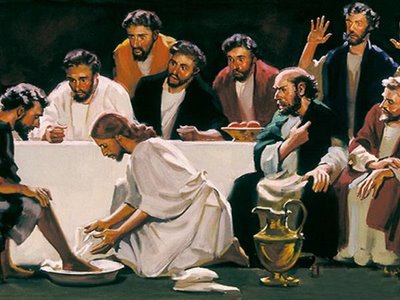
THEME: HUMILITY
READINGS: Zechariah 9:9-10 / Romans 8:9, 11-13 / Matthew 11:25-30
14th Sunday in Ordinary Time
It was mentioned in Sunday’s homily that St. Paul admonishes us to be as humble as Christ Jesus. In today’s gospel reading it is the Lord who exhorts us to be as humble as himself: “learn from me, for I am gentle and humble in heart” (Mt. 11:29).
Pride is the opposite of humility. The proud person boasts of his/her achievements, talents and status. He/she usually sees him/herself as more important than others. To an extreme degree, the proud person does not know or see his/her limitations: he/she thinks he/she can do everything. In such a case, he/she equates him/herself to God. This was the sin of our first parents, Adam and Eve. They were tempted to take the fruit of the tree so that they would be like God. Prov. 18:12 says: “Pride goes before one’s downfall”, and it certainly preceded the first and great fall of Adam and Eve.
Humility, on the other hand, is that attitude which considers one’s status and all that he/she has as coming ultimately from God – for one’s life, strength, talents and intelligence and therefore his or her achievements are all from God. In other words, the humble person is often conscious of the fact that he/she is only a creature, and therefore acknowledges that his/her life and achievements are possible because of God’s mercy and other graces. Because of this, the humble person is ever grateful to God, without whom he/she can do nothing (cf. Jn. 15:5).
When pride had closed the gates of paradise to mankind, humility became the key with which the gates were opened. This is because, for the Son of God to leave his glory and become man to save us, he had to humble himself (Phil. 2:6-11). Beloved, even today humility unlocks the gates of heaven for God’s blessings to descend on us from above. Thus, Sirach writes: “The greater you are, the more you should behave humbly, and then you will find favour with the Lord” (Sir. 3:18). This is in line with the popular saying of Jesus: “everyone who humbles himself will be exalted” (Luke 14:11). In other words, God blesses the humble person.
The key of humility does not only allow blessings to come down, it also makes it possible for the humble to enter into Paradise. Thus, the Lord God says: “I will dwell in the High and Holy place with him who has a contrite and humble spirit” (Is. 57:15). Beloved, there is also another good news about humility. That is, even before we enter the heavenly Kingdom, humility conveys our prayers there. Remember the parable of Jesus in which a Pharisee and tax collector went to the temple to pray. It was the latter (rather than the self-righteous Pharisee) whose humble prayer was heard by God (Lk. 18:9-15). The power of humility to convey our prayers to heaven is emphasized by Sirach: ‘the prayer of the humble pierces the clouds and he will not be consoled until it reaches the Lord’ (Sir. 35:17-18). Beloved, planes and space shuttles may pierce the clouds, but they cannot reach heaven; you see, then, how powerful the prayer of the humble is!!! Humility is a powerful spiritual fuel that pushes our prayers beyond the clouds to God’s very throne of Grace.
For the above and several other blessings that the virtue of humility brings into our lives, let us endeavour to practice it. Let me conclude with the edifying words of St. Peter: “All of you, be humble in your dealings with each other because God opposes the proud but gives his grace to the humble. Bow down, then, before the power of God so that he will raise you up at the appointed time” (1 Peter 5:5-6). Amen!
By Very Rev. Fr. John Louis








